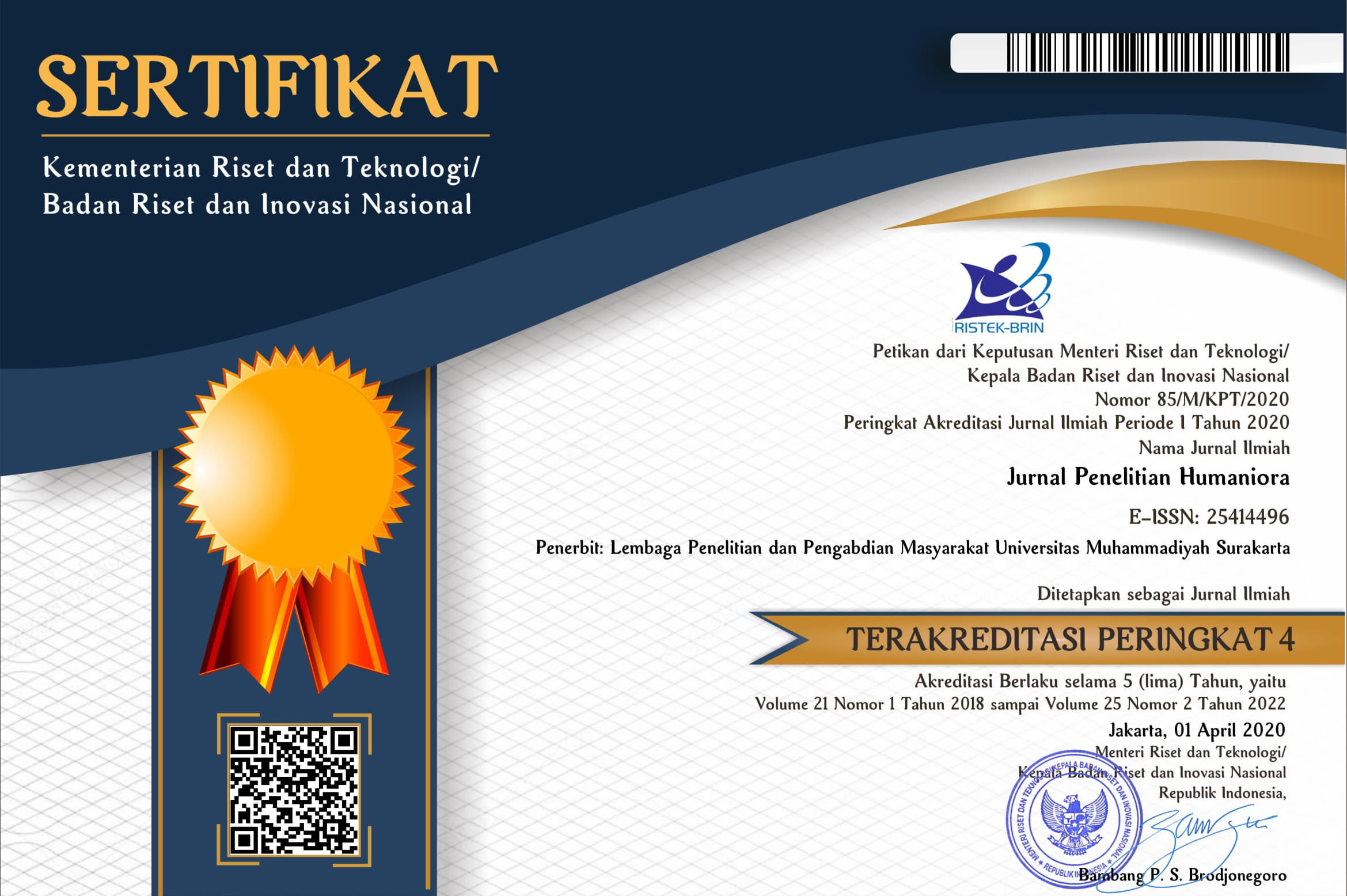KONFORMITAS KELOMPOK, HARGA DIRI DAN EFIKASI DIRI SEBAGAI PREDIKTOR PERILAKU KETIDAKJUJURAN AKADEMIK PADA SISWA
Setya Putri Lestari(1*), Sri Lestari(2)(1)
(2)
(*) Corresponding Author
Abstract
This research is aimed to analyze group conformity, self-esteem and self-efficacy
empirically as predictors of academic dishonesty behavior on MTsN students.
Hypothesis is conducted by applying regression analysis.Data collecting used on this
research are four scale measurements of academic dishonesty, group conformity, selfesteem
and self-efficacy. Respondents involved in this research are 280 students of
MTsn between 12 to 16 years old range, consisting 138 male students and 142 female
students. The analysis shows that group conformity, self-esteem and self-efficacy
variables contribute 39,7 % toward students’ academic dishonesty. Conclusively, the
result of this research confirms that group conformity, self-esteem and self-efficacy
are predictors of academic dishonesty on MTsN students. The strongest variable
among them is group conformity.
Keywords
Full Text:
PDFReferences
Alapare, A.I. dan Onakoya, A. Y. (2002). Correlates of Examination Cheating Behaviour
Among University Students. Department of Psychology University of Obadan, Nigeria.
Alhadza, A. (2005). Masalah Menyontek Di Dunia Pendidikan. Tersedia dalam http:www.bsi.
ac.id./modules.phpx
Baron, R.A. & Byrne, D. 2005. Psikologi Sosial. Jilid II Edisi kesepuluh (terjemahan Djuwita,
R). Jakarta: Erlangga.
Bandura, A. (1997). Self Efficacy The Excercise of Control. New York: Freeman
Bates, I.P & Davis, J.P. (2004). Studying Academic Dishonesty. Paper in Educational
Development University of London.
Bjorklund, Mikela, & Wenestam, C. G. (2000). Academic Cheating: Frequency, Methods, and Causes. Paper Presented at the Eurupean Conference on Educational Research, lahti, Finland 22-25 Sepetember 1999.
Cozby, P. C. (2009).Methods in Behavioral Research (10th Ed.). New York : McGrawHill.
Donnellan, M.B., Trzesniewski, K.H., Robins, R.W., Mofftt, T.E., & Caspi, A. (2005). Low
Self Esteem is Related to Agression, Anti Social Behavior, and Delinquency. Psychological
Science
Elias, R.Z. (2009). The Impact of Anti-Intellectualism Attitudes And Academic Self Efficacy
on Business Students Perceptions of Cheating. Journalof Business Ethics, 86, 199. 2009.
New York. Springer.
Ghufron, Nur. M. & Risnawati, Rin. (2010). Teori-teori Psikologi. Yogyakarta: Ar-Ruzz Media.
Harding, Trevor, S., Donald, D., Carpenter, Susan, M., & Nicholas, H. S. (2001). The Current
State of Research on Academic Dishonesty Among Engineering Students. Presented at
st
Iyer, R., & Eastman, J. K. (2006). Academic Dishonesty : Are Business Students Different
From Other College Student?. Journal of education for business; Nov/Dec; 2006 82,2;
Academic Research Library pg. 101.
Kerlinger, F. N. (2000). Foundation of Behavioral Research (4th Ed.). New York : Holt, Rinehart
& Winston.
Lambert, E. G., Hogan, N. L., Barton, S.( 2003). Collegiate Academic Dishonesty Revisited:
What Have They Done, How Often Have They Done it, Who Does it, And Why Dis They
do it?. Electronic Journal of Sociology. Vol 7.4. tersedia dalam http//www.sociology.org/
content/vol 7.4/Lambert-etal.html
Martinez, I. & Gracia, J.F. (2007). Impact of Parenting Style on Adolescent’s Self Esteem and
Internalization of Values in Spain. The Spanish Journal of Psychology, 10. 338-348.
Martinez, I. & Gracia, J.F. (2008).Internalization of Values and Self Esteem among Brazilian
Teenagers from Authoritative, Indulgent, Authoritarian, and Negrectful Homes.
Adolescence, 43, 13-29
McCabe, D. L., Feghali, T., Abdallah, H. (2008). Academic Dishonesty in The Middle East :
Individual and Contextual Factors. Res High Educ 49;451-467.
McCabe, D. L. (2009). Academic Dishonesty in Nursing Schools: An Empirical Investigation.
Journal of Nursing Education48;614-623.
Mighwar. (2006). Masalah Menyontek (Cheating) Di Dunia Pendidikan. Tersedia dalah
http:www.bsi.ac.is/modules.phpx
Monks, F.J. (2002). Psikologi Perkembangan: Pengantar dalam Berbagai Bagiannya. Gadjah
Mada University Press: Yogyakarta.
Myers, D. G. (2007). Social Psychology. USA: McGrow-Hill,Inc.
Neighbors C, Larimer ME, Geisner IM, Knee CR. Feeling controlled and drinking motives
among college students: Contingent self-esteem as a mediator. Self and Identity.
;3:207–224.
Ormrod, Jeanne Ellis, (2009). Psikologi Pendidikan Membantu Siswa Tumbuh dan Berkembang
Jilid 2. Jakarta: Erlangga.
Pajares, F., & Schunk, D. H. (2001). Self-Beliefs and School Success: Self Efficacy, Self
Concept, and School Achievment. Chapter in R. Riding & S. Rayner (eds). London: ablex
Publishing. Tersedia dalam http://www.des.emory.edu/mfp/self-efficacy.html
Papalia, D.E.,Olds, S.W., dan Feldman, R. D. (2009). Perkembangan manusia. Edisi kesepuluh
Buku 2 (Terjemahan oleh Brian Maswandy). Jakarta: Salemba Humanika.
Petress, K. C. (2003). Academic Dishonesty : A Plague on Our Profession. Academic Research
Library pg. 624.
Santrock. J. W. (2003). Live Span Development (Perkembangan Masa Hidup). Edisi 5. Alih
bahasa: Chausairi, A. Jakarta : Erlangga.
Sugiyono. (2011).Statistika untuk penelitian. Alfabeta : Bandung
Sears, D.O. (2004). Psikologi Sosial jilid 2. Jakarta: Erlangga.
Taylor, S.E., Peplau,L.A., & Sears, D.O. (2009). Psikologi Sosial Edisi XII. Jakarta: Kencana.
Article Metrics
Abstract view(s): 1585 time(s)PDF: 2545 time(s)
Refbacks
- There are currently no refbacks.











